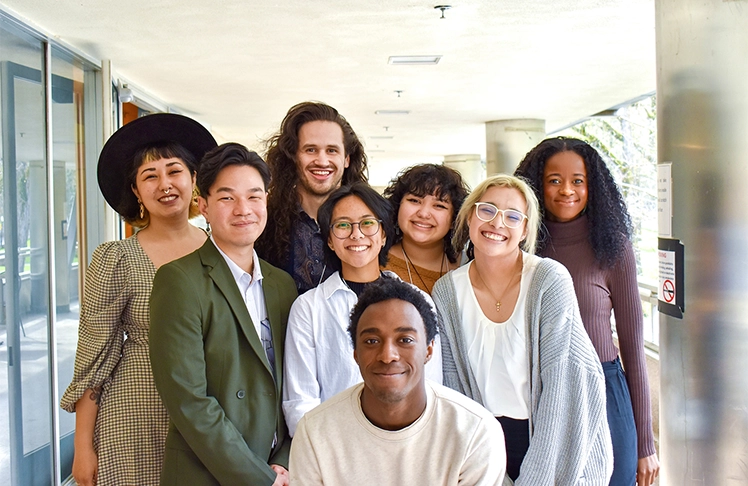
By Kiara Doyal, The Seattle Medium
North Seattle College (NSC) recently announced the renewal of a three-year, $1.5 million grant from the National Science Foundation (NSF) to bolster their Louis Stokes Alliances for Minority Participation (LSAMP) program. This initiative, which has served over 160 students in the past two years, supports underrepresented communities aspiring to enter science, technology, engineering, and mathematics (STEM) fields.
“LSAMP is a federally funded program, and we exist to support the increase in recruitment, enrollment retention, and completion of students of color in STEM programs,” says Tina Akinyi, director of LSAMP at North Seattle College. “Specifically, in our context, we serve students at the two-year college level, and we really want to support them in completing their degrees and transferring into four-year programs like the University of Washington and Washington State University.”
Underrepresented students often face significant barriers in STEM fields, and this funding aims to change that trajectory by strengthening the growth, preparation, representation, and success of historically underrepresented students in STEM.
“This grant renewal represents a critical part of our mission to prepare each student for success in life and work, fostering a diverse, engaged, and dynamic community,” says NSC President Dr. Rachel Solemsaas. “In the first two years, we have seen the LSAMP program grow by nearly 90%, and the retention rate is higher than 77%, and is only getting better.”
NSC’s involvement in LSAMP is part of the Puget Sound Alliance, a collaboration with Green River College (GRC) and Pierce College (PC). Each institution is dedicated to enhancing programs that support LSAMP students in completing their associate of science degrees and transferring to STEM baccalaureate programs.
“This is a renewal grant, and specifically in our proposal was to improve access for students of color to transfer, and so between the three campuses we have certainly achieved that, and in this renewal, it is just a continuity so we can start the next cohort of students,” says Solemsaas.
“What is also nice about LSAMP, in addition to those who have transferred to four-year universities since attending NSC, PC, and GRC, students also have our applied baccalaureate offerings, and a number of them have also stayed to pursue and complete the baccalaureate program with us,” she continued.
The NSF grant aims to close the education gap for students of color in STEM, providing NSC and its partner schools the resources to bridge this gap and offer these students greater opportunities for success.
“The focus for us is really our students of color. We are honored to receive this grant and be able to actually fulfill that intent and really help increase the representation of underrepresented students in STEM because there is a huge gap. Not just students of color, but also women, particularly women students of color, and that has been our focus here at North Seattle College,” says Solemsaas.
One of NSC’s key strategies is providing research opportunities to their students of color, as those who engage in research are 13% more likely to persist in their studies. Akinyi and her team plan to utilize the new funding to enhance academic support, including tutoring, supplemental instruction, and training for faculty and staff across the three colleges. Mental health resources will also be a priority, addressing the impacts of COVID-19 on historically marginalized students.
“To ensure that we are staying committed to our students of color, we are going to be working on academic support, which could be in the form of tutoring, supplemental instruction, and providing training for faculty and staff across the three colleges,” says Akinyi. “We are also going to be focused on mental health resources for our students because COVID did a number on our students, especially students who are historically marginalized or more impacted by COVID, so we just really want to make sure that we are providing those mental health resources to help them be as healthy as possible for their programs.”
Akinyi also expressed her concerns about the current lack of representation in the STEM field and emphasized the importance of supporting students of color in these programs to make science more diverse and inclusive.
“STEM is very white, and it is also very male. As we know, science is very subjective, so the way scientists perform their science and their research is highly dependent on their lived experiences and their backgrounds, which could include their faith, religion, ethnicity, gender, sexuality, and nationality,” says Akinyi. “And so, because of that, if we have a field that is very white and very male, then what does that say about the kind of science we are producing as a society.”
Both Akinyi and Solemsaas understand the critical role the LSAMP program and the new funding play in ensuring success for students of color in STEM fields.
“As a person of color myself, and with several other marginalized identities, I definitely feel like I understand how important it is that we are given the opportunity to succeed, particularly in education, so LSAMP is really supporting these community colleges in opening opportunities in STEM for underrepresented students to pursue their dream,” says Solemsaas.
“It is important that all voices are being represented in science because it impacts everybody in all different facets of life,” says Akinyi.



